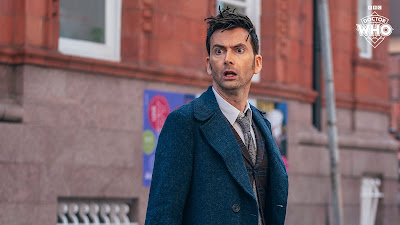How Doctor Who can win over old and new fans
One of the challenges for a show with that sort of longevity is to know when to lean into nostalgia and when to emphatically say, "you know what guys, we all love the Terrapetils, but maybe we need a new start."
It's a dilemma which grows over time. When the programme revived in 2005 the task was to win over those who'd grown up with the original series and a new generation of fans.
At 18 years, "New Who" is now itself old enough to get drunk, leave home and buy kitchen knives so those originally drawn in by the revival are themselves as distinct from a bunch of nine-year-olds who might be puzzled to find that the Last of the Time Lords is now suddenly a man.
Had I spent more time trying to grasp the complexities of dating rather than Unit dating [there's a great pun there that will land with some 0.2 per cent of readers] then the challenge of attracting and holding on to multiple fanbases could even, by now, have been encapsulated by my own family.
There's my Dad, who was there to see the whole thing get started in 1963. Myself who lived through the so-called "wilderness years" and became a proper fan when the show returned in the noughties. And my imaginary six-year-old who would be wondering why her father was jabbing furiously at the TV screen and shouting "Look Romana (1), it's David Tennant!"
Of course it's not even as simple as all that - the old fans came back for the new show and the new fans became familiar with the old. Meanwhile the new new fans are probably puzzled as to why Santa keeps smuggling DVDs of The Sontaran Experiment into their stocking, when surely even the North Pole has streaming now.
Let's have a think about the increasing complexity of all this.
My Dad has seen almost all of the new series - even if he managed to doze off 17 minutes into absolutely every Christmas special - so he knows all about Donna Noble. In fact I remember him loving every second of the character's debut in The Runaway Bride - or at least the ones he was awake for - while I sat and scowled at the scenery-chewing spider. I was 19 see and if I was going to spend Christmas night watching a children's sci-fi show I damn well wanted gravitas.
Conversely I can't deny that a lot of my excitement for the upcoming 60th anniversary is fuelled by the fact that the Celestial Toymaker is returning for the first time since 1966. Which is vaguely ridiculous since not only did I obviously not see that episode at the time but I've never seen it since either, given it was wiped by BBC executives in the distant past and now only survives in the memory banks of obscure online forums. When I mentioned the Toymaker to my Dad this morning he frowned slightly and said "Oh yeah right, I think I remember him." Which sounds impressive until you realise that he said the same about David Cameron the other week...
The latest trailer for the upcoming 60th shows landed last night and shows the tight-rope that the programme must tread in terms of appealing to several different groups of viewers. When is nostalgia a lifeline and when is it a noose round the neck?
When Russell T Davies first brought the show back he seemed adamant that any callbacks to the past weren't about to alienate the average eight-year-old who perhaps unsurprisingly wouldn't be ready for plots to pivot on loose ends from The Talons of Weng Chiang.
Instead the nods when they came were nuanced, a little reward for those in the know but not likely to baffle someone who was still of reasonable proportions to fit behind the sofa (2).
I always felt this balance was best struck in School Reunion, the first episode of the revival which properly dealt with the fact the show had a history before that grim-looking Northern bloke got the job.
For kids the return of classic series companion Sarah Jane-Smith was probably secondary to the fact that evil alien-bat creatures were poisoning chips in a school canteen (3) .
And it was obviously funny that she won her "I've fought better monsters than you" battle by telling the Doctor's current paramour that she'd had a run in with the actual Loch Ness Monster. A reference which left the real nerds shouted "she's talking about the bleeding Skarasen" in the middle of the living room.
The problem with clean slates is they all too quickly get crowded. There's no doubt that RTD's iron-discipline when it came to careful cross-pollination between the new series and its earlier incarnation wasn't matched when it came to referring back to his own previous storylines or indeed the show's growing number of spin-offs. Even that post-watershed one in which John Barrowman threatened to do on screen what he'd been doing on set for several years.
This self-referential tendency continued under showrunner Steven Moffat and arguably also crossed the red line when it came to the classic series. By the latter stages of the Peter Capaldi era, everything from the pacing of an episode to the musical stings assumed you'd be excited by the shock revelation that an alien starcruiser came from the planet Mondas. MONDAS!!!
It wasn't just the fan-pleasing which was perhaps running out of control. Perversely Chris Chibnall wasted far too much time on grand narratives seemingly set on winding up the hardcore Whovians, even as revelations about the past carried next to no emotional punch for the increasingly dwindling casual audience.
It is against this rather challenging backdrop that a trilogy of 60s special will attempt to reignite interest in a show which has undoubtedly lost much of its broader appeal in recent years.
At first glance the new trailer suggests it won't be shy on fan service. For the first-time ever the brand-new Doctor is in fact an old Doctor (Tennant), the Toymaker is one of the most obscure adversaries to return from the show's early years and one of the episodes is a partial adaptation of a classic comic strip from Doctor Who Magazine.
At the same time I feel surprisingly confident that the story will be pitched right. Whether you welcome their return or not, Tennant and Tate hail from the point where the show was at or near the pinnacle of its mainstream success. Their brief return might feel like playing safe but it's also rather smart.
I suspect the reappearance of The Toymaker will be carefully handled. For those who haven't read all 288-pages (4) of Doctor Who: The Secret Life of Monsters there's still the fact they've cast the pretty well-known Neil Patrick Harris in the part. And for youngsters he's an evil extra-terrestrial prankster who wears some great costumes - what's not to love?
And finally there's Beep the Meep - who, as mentioned above, has been plucked from the pages of a 40-year-old comic. Although I think to be honest this is absolutely in keeping with RTD's obvious love of cutesy looking things that will kill you, a staple of alien threats during his first stint as showrunner.
He must have hooted - as only the ebullient Welshman can - at the thought of returning to a favourite theme by introducing a character from one of the most niche corners of fandom. But I hardly expect that the audience will need to follow footnotes (5) or consult a pull-out continuity guide in The Radio Times to understand the age-old concept that the initially unthreatening can be pretty damn frightening. That's been at the heart of Doctor Who's DNA since the days when sink plungers became the tools of intergalactic conquest and Satan-worshipping Morris dancers started whacking Jon Pertwee with sticks on a picturesque village green.
The old ideas that first set the show on its way in November 1963 are actually still pretty damn robust many decades on. So long as they're handled in a new way - and don't require an encyclopedic knowledge of the past - I'm more than confident there's life in the Time Lord yet.
(1) - Why on Earth would I call my daughter Romana? Because by the time I called out "Look out Romanadvoratrelundar" she'd have already been hit by the speeding bus.
(2) - This is further proof of why many newspaper opinion writers are Tories, because no normal-sized family home has room to avoid putting a settee firmly against the wall.
(3) - This was an early warning to The Daily Express that the BBC's flagship family show had been infiltrated by the "wokerati", with a full-throated endorsement of Jamie Oliver's healthy school meals agenda.
(4) I actually counted. One terrible night...
(5) I could hardly ignore the fact that a blog post ostensibly about a long-running show not losing sight of appealing to casual viewers has peppered nearly every paragraph with obscure in-jokes that literally no-one - even amongst my fairly-geek leaning friendship group - is likely to get.






Comments
Post a Comment